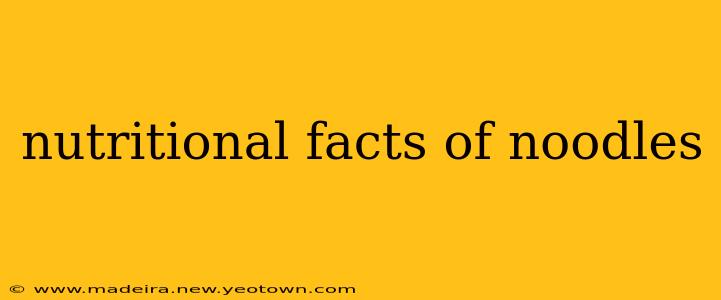Noodles. The ubiquitous culinary staple, a comforting bowl of warmth on a chilly evening, a quick and easy lunch, or a vibrant ingredient in countless dishes across the globe. But have you ever stopped to consider the nutritional facts hiding within those seemingly simple strands? This journey will explore the nutritional landscape of noodles, revealing the subtle variations across different types and offering insights to make informed choices for your well-being.
What are the main nutrients in noodles?
The nutritional profile of noodles significantly depends on their ingredients. Plain, basic noodles, typically made from wheat flour, water, and sometimes eggs, offer a source of carbohydrates, providing energy. They also contribute a small amount of protein. However, the quantities of these macronutrients vary depending on the type of noodle. For instance, egg noodles contain more protein than those made solely from wheat flour. Let's unpack the common nutrients further.
Carbohydrates: Noodles are primarily carbohydrates, offering quick energy. However, the type of carbohydrate – simple or complex – influences their impact on blood sugar levels. Refined wheat noodles generally contain more simple carbohydrates, while whole wheat noodles boast a higher proportion of complex carbohydrates.
Protein: The protein content is generally modest in most noodle varieties. Egg noodles, as mentioned, offer a slightly higher protein profile. However, noodles aren't typically considered a primary source of protein in a balanced diet.
Fiber: The fiber content is significantly influenced by the type of flour used. Whole wheat noodles generally provide more fiber than refined wheat noodles, which contributes to digestive health.
Vitamins and Minerals: The vitamin and mineral content in noodles is usually quite low unless fortified. Some brands might add certain vitamins and minerals to boost their nutritional value.
Are noodles healthy?
The healthiness of noodles is a nuanced question. It's not a simple "yes" or "no" answer. The nutritional value of noodles largely hinges on the type of noodle and the ingredients accompanying them. Plain, whole-wheat noodles can be part of a healthy diet, especially when paired with nutrient-rich vegetables, lean proteins, and healthy fats. However, heavily processed noodles, often loaded with sodium and unhealthy additives, should be consumed sparingly.
How many calories are in a serving of noodles?
Calorie content varies drastically depending on the type of noodle, the serving size, and any added ingredients. A typical serving of plain, cooked wheat noodles might range from 150-200 calories, but this can easily increase with sauces, added meats, or vegetables. Always check the nutrition label on the package for the most accurate information.
What are the different types of noodles, and how do their nutritional values differ?
The noodle world is diverse! From the delicate strands of spaghetti to the hearty thickness of udon, each type offers a slightly different nutritional profile.
- Wheat Noodles: These are the most common type, with variations in refinement. Refined wheat noodles are lower in fiber and nutrients than whole wheat noodles.
- Egg Noodles: These contain eggs, adding a slightly higher protein content compared to plain wheat noodles.
- Rice Noodles: Made from rice flour, these are often gluten-free and lower in protein than wheat noodles.
- Soy Noodles: Made from soy flour, these are a good source of plant-based protein.
- Shirataki Noodles: Made from konjac yam, these are extremely low in calories and carbohydrates.
Are there any health risks associated with eating noodles?
Excessive consumption of refined noodles can contribute to weight gain due to their high carbohydrate content. Additionally, some noodles may contain high levels of sodium, which can negatively impact blood pressure. Individuals with gluten intolerance should avoid wheat-based noodles. Always read ingredient labels carefully to be aware of potential allergens or additives.
In conclusion, the nutritional value of noodles is highly variable and dependent on numerous factors. Making informed choices about the types of noodles you consume, the portion sizes, and the ingredients you pair them with is key to incorporating them healthily into your diet. Remember to choose whole-grain options when possible and balance your noodle intake with a wide range of other nutrient-rich foods.

